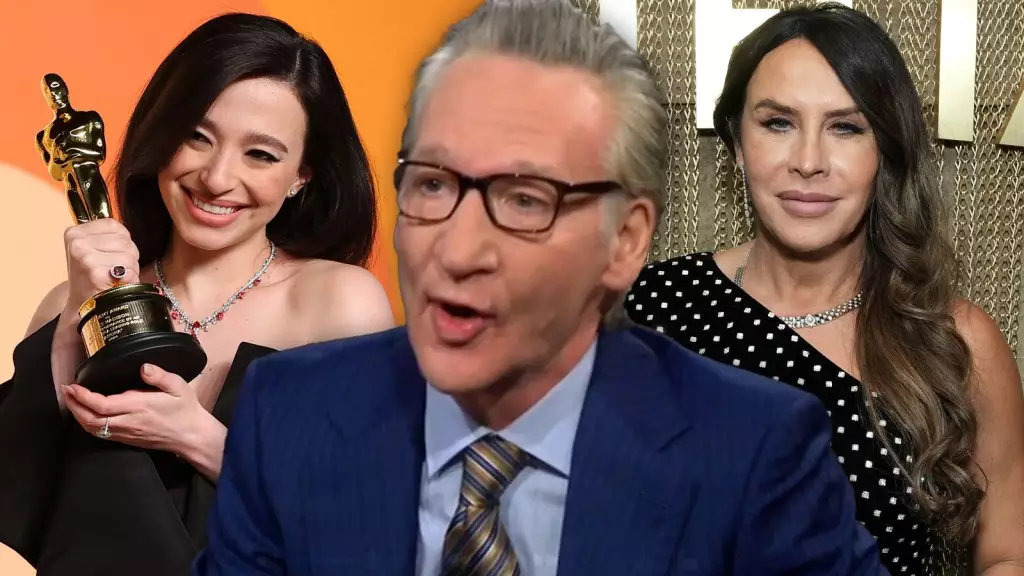Bill Maher’s recent discussion on “Real Time” with David Sedaris sheds light on an evergreen topic: cancel culture. This concept, once perceived as a mere social media frenzy, has evolved into a complex and multifaceted phenomenon that can significantly impact the public and individuals alike. Many may argue that cancel culture is a mere illusion, a hyperbolic reflection of the times. Yet, as Maher poignantly pointed out, it manifested itself even at the Oscars, influencing the trajectory of careers and award outcomes. To label cancel culture as a non-issue is to disregard the real consequences that emerge from a society demanding accountability and wrestles with its moral compass.
The Karla Sofía Gascón Incident: A Case Study
The controversy engulfing Karla Sofía Gascón illustrates the harsh reality of cancel culture. Following the resurfacing of her problematic tweets, Gascón faced intense scrutiny, spotlighting not only her personal failings but also the collective consciousness of the industry. The fallout was swift; Emilia Pérez, once considered a frontrunner for an Oscar, saw her prospects vanish in the wake of this scandal. Instead, it was the film “Anora” that seized the night, claiming major awards and marking a notable shift in Hollywood’s narrative. The incident serves to underscore the power dynamics at play and how swiftly public sentiment can alter an individual’s standing in an industry that thrives on visibility and acclaim.
The Double-Edged Sword of Visibility
In an age marked by social media’s omnipresence, the boundary between private opinion and public persona continues to blur. Are celebrities subject to stricter expectations than the average person? Possibly. However, this expectation stems from a desire for a social contract where personal integrity reflects professional conduct. The intense backlash against Gascón’s tweets suggests that audiences increasingly demand that public figures operate under a stringent ethical microscope. The very nature of celebrity culture means that visibility can be both a blessing and a curse, allowing for rapid ascent but equally devastating declines.
Maher’s Perspective on Wokeness and Accountability
Maher’s take on the “woke community” offers an interesting lens through which to analyze the conversation around cancel culture. His insinuation that today’s cultural warriors may overreact raises significant questions about intent versus impact. While it is essential to hold individuals accountable, the line between meaningful discourse and knee-jerk outrage is increasingly difficult to discern. Maher’s critique resonates with those who believe that honesty and vulnerability shouldn’t be grounds for public vilification. Irony prevails in the fact that while many individuals champion progressive ideals, they often weaponize them without room for learning or growth.
The Role of Apologies in the Cancel Culture Landscape
Gascón’s public apology serves as a microcosm of the rehabilitation process that often accompanies cancel culture’s fallout. It raises the question: when is an apology sufficient? The rhetoric of contrition, grounded in personal struggle and a desire for change, invites a broader conversation about forgiveness in today’s society. However, the authenticity of such apologies is frequently challenged in the court of public opinion. The dismissive “too little, too late” mentality prevails, further complicating the potential for redemption. Given the real harm inflicted by careless words, we must balance the demands for accountability with compassion for personal growth.
The Final Outcome: Shifting Hollywood Narratives
The Oscars marked a moment of transformation not just for individual careers but for the realm of storytelling in cinema. With “Anora” taking home the awards, it signifies a shift towards narratives that prioritize inclusivity and representation. Yet, this very triumph came at the cost of another’s downfall, signaling the ruthless nature of the entertainment industry. As Maher aptly noted, cancel culture isn’t going away; it’s merely evolving into more subtle forms, entwining itself with the fabric of societal norms and expectations.
In navigating this challenging landscape, we must confront our own biases and the role we play in shaping the narratives that emerge. Each incident becomes not just a story about a person but a reflection of a society grappling with its values and the implications of a cancel culture that relentlessly demands change.

